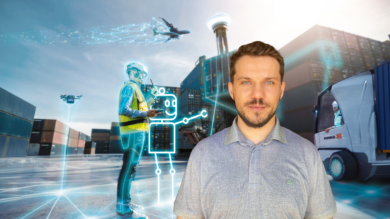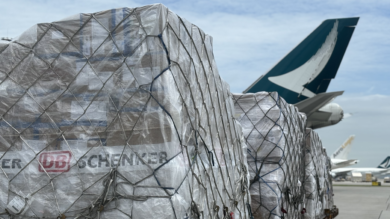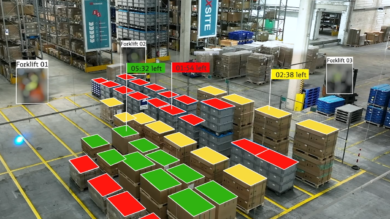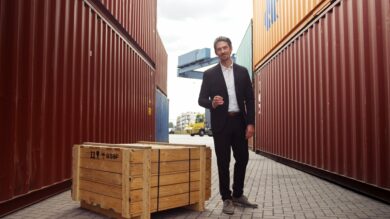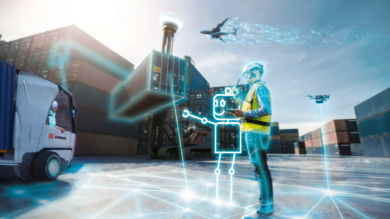“In every crisis, there is something good!” It is not easy to believe that, when you are hit by a global pandemic, watching the pictures around the world, which won’t let you sleep, and struggling with your own health every day while keeping up the work and homeschooling. That is the time when resilience and well-being are needed most. There is no doubt: This pandemic is going to change the ways we are working in the future dramatically.
The pandemic has proved that organizations and workers are capable of tremendous resilience under pressure as Deloitte has stated in their Global Human Capital Trends 2021. In a new world of constant disruption, static planning does not help anymore. It is more about creating a place where people can develop dynamically and evolve solutions for the future. Taking this into account, the importance of purpose increases. Organizations, not only in logistics, need to manage their workforce better by potential and by changing perspectives.
Logistics Matters interviewed Yvonne Villinger, Vice President and Head of Center of Excellence Global Talent Management & Culture at DB Schenker. She is an expert when it comes to culture change and talent management of global organizations with 25 years of experience in different positions and industries across operational business roles and on the frontline in the hotel industry, plus within human resources in the logistics industry for DB Schenker.
“DB Schenker’s culture has been truly tested in the last 14 months with finding new ways to ensure our customers are able to keep moving, our teams finding new ways to connect virtually with each other and their customers, and I would say that it and our people have delivered.”
Logistics Matters: How has the pandemic changed the culture in the logistics industry, its importance, and the way we work together?
Yvonne Villinger: Overall, for us at DB Schenker, I believe it has cemented us even more as one team. Through new ways of working which have included more remote working locations than before, our teams have come together to make it all work. Which in the last year has meant to come together quickly and often to find solutions to keep the logistics industry moving, including the important factors of the pandemic and such as to keep medical supplies, safety equipment, and the vaccine moving. Something, I believe, we can all be very proud of.
Many organizations, due to the pandemic, are rethinking their working arrangements – so are we at DB Schenker. This will eventually settle on a sustainable new normal, likely hybrid workforce and distributed workplace. DB Schenker’s culture has been truly tested in the last 14 months with finding new ways to ensure our customers are able to keep moving, our teams are able to find new ways to connect virtually with each other and their customers, and with that, I would say our people have delivered.
Logistics Matters: At DB Schenker you have started a series on resilience and well-being for all employees. Why is it so important and what do you expect from that?
Yvonne Villinger: People working from home face some specific challenges. Those who work from home or remotely from elsewhere, inevitably accept that the clear boundaries between their professional and private lives will blur. They lose their frame of reference and task orientation. Home colleagues do not receive signals about when to switch off, whereby office colleagues or those on the site do when they finish at the end of the working day. And while remote work can be seen to provide more freedom and flexibility, it is also associated with the fear of burnout with the pace and blurring of boundaries.
Many colleagues working from home have been adjusting to a new routine which includes things such as childcare, homeschooling their children, and, in some cases, taking care of sick relatives. The stressors brought on by the coronavirus add to chronic stress that many employees already experience. Work flexibility corresponds with the emerging needs for health and wellness resources, especially if employees work in unusual and unpredictable workplaces where they are more prone to burnout. If one employee is feeling burnout, it can affect an entire team, the customers, and ultimately the business itself.
This tells me that forward-looking leaders will lead best by promoting employee mental health and overall wellness awareness. And importantly, that individuals have the means to learn some coping strategies quickly, and perhaps with such a campaign, we can all come together as one team to support one another. Therefore resilience and well-being are strategic trend topics for us.
Logistics Matters: Now, looking deeper at the potential of the workforce – this seems to be another key trend in logistics. How did you take this up at Global Talent Development and what role does resilience play in this?
Yvonne Villinger: Improved workforce management – for all employees – is a significant opportunity for logistics companies. Ideally, we would want all our employees to have the willingness and flexibility to learn, adapt and change as they go, but simultaneously our leaders need to ensure that their people are with them on the journey of growth and change. Both the core and extended logistics workforce is enduring an unfamiliar and often highly stressful work environment. Companies that thrive address the mental, physical, and emotional well-being of their organizations. Therefore, it is important for us to cement these topics into our leadership development.
We incorporate resilience into learning. In our first-level leadership program, it forms the foundation of the 6-months learning experience, as we believe it is not only a response to the pandemic but also an important leadership trait. At our recent “Leaders in Conversation”, our launch topic was “Resilient Leading, Living & Learning”. As leaders to our teams, our sites, and our communities, we want to discuss how we lead with resilience, live a resilient life, and learn to strengthen our resilience.

Logistics Matters: What do resilience and well-being mean to you personally and in addition as a leader of a global team?
Yvonne Villinger:
For me, leadership is a privilege. My team needs and deserves a leader that is authentic and able to make decisions, be creative, have a laugh with and know that I am strong to always have their back. Therefore, personally, resilience and well-being are tremendously important to me, so that I can be the leader that my team needs, and through ‘walk the talk’ my team knows that it’s ok and important for them to look after themselves.
“I cannot change nor am I responsible for the behavior of others, but I can change how I deal with it, how I look after myself to remain resilient.”
I am often asked why this space is so important to me, personally, I can say I have ‘been there’. I have suffered a fractured spine in my early frontline days and later in life, I have experienced both discrimination and bullying. What this has taught me is that I cannot change nor am I responsible for the behavior of others, but I can change how I deal with it and how I look after myself to remain resilient.
In the current pandemic to remain resilient, the normal walk around the block is not enough anymore, as like with many, I have blurred the lines at home. But I changed gears quickly, I find myself relishing online learning, mentoring and insights into topics I never seemed to do before. I rediscovered meditation, which is a treat. I am very grateful for facetime, so I can see my family in Australia who due to the borders being closed I will most likely not see for a couple of years. I certainly look forward to that hug when we do!
Published June 2021




